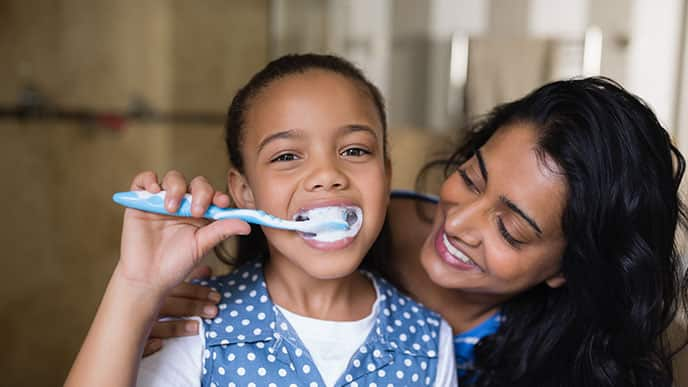Causes of Bleeding Gums in Toddlers
Does your toddler have red, tender, or swollen gums? Or pink-stained saliva after toothbrushing? Those signs and obviously bleeding gums signal your toddling tot might be experiencing one of these conditions:
Plaque and Gingivitis (Gum Disease): We know you do your best to take care of your youngster's needs. But, unfortunately, the culprit causing your toddler's bleeding gums can be improper oral health care. In fact, plaque build-up resulting in gingivitis is the most frequent cause of bleeding gums in toddlers, according to the International Association of Paediatric Dentistry (IAPD).
Here's how it happens:
- Your toddler's mouth bacteria feed on sugars from sweet and starchy foods to form plaque on your little one's gums and teeth.
- The plaque hardens into tartar, leading to tooth decay and gingivitis.
- Gingivitis inflames gum tissue and will bleed when brushed.
Gingivitis typically results from insufficient or incorrect brushing. When overlooked or ignored, gingivitis can develop into more serious gum disease stages, which can be difficult to reverse.
The good news is that you can treat toddler gingivitis at home. And best of all, you can prevent gingivitis. Look for our tips below.
High-Sugar Diet: You already know that soft drinks and candy are bad for gums and teeth. But did you know that fruit juice and dried fruit snack bars are also high in sugar? And high-carbohydrate or starchy foods – bread, chips, crackers, pasta, potatoes, and pretzels – turn into sugars that can cause plaque and lead to bleeding gums?
Dry Mouth and Gums: The IAPD details how dry gums can bleed easily in a mouth that always should be moist. Toddlers can develop dry gums as a result of:
- Breathing through their mouths instead of their noses due to allergic reactions or swollen tonsils or adenoids.
- Inability to close their mouths at night – the result of a short upper lip or another orthodontic issue.
Gum Injury: Healthy gums also sometimes bleed when injured by vigorous brushing or brushing with a hard-bristled toothbrush.
Medical Condition: While it's rare, there might be a medical reason your toddler's gums bleed. If you treat the bleeding gums (see below) and your little one's gums continue to bleed, talk to your dental professional.
Treating and Preventing Bleeding Gums
By taking the following actions to treat your child's bleeding gums, you should be able to reduce the bleeding in seven to 10 days, according to the IAPD. These treatments also serve as a guide for preventing bleeding gums.
Brush: Gently brush your toddler's teeth and gums with a soft-bristled, small-headed toothbrush that fits comfortably in your toddler's mouth. Take care that you:
- Brush twice daily at the very least: after breakfast and before bedtime. (Brushing after sugary or starchy snacks is also strongly recommended.)
- Don't avoid touching the gums with the toothbrush – even if the gums bleed. If you're gentle enough, you will eventually remove the plaque that's causing the bleeding.
- Smear a sliver of toothpaste on the bristles for toddlers under two years of age. And use a pea-size amount for children aged two to five.
- Help older toddlers who want to try brushing their teeth by themselves.
Floss: Gentlyclean between your tot's teeth when two of the teeth start touching, usually around age 2 or 3. This is essential for completely removing plaque. Waxed floss, floss picks, or interdental cleaners for toddler's mouths work best.
Serve: A tooth-friendly diet can set your toddler up for everlasting healthy eating habits. Recommendations include:
- Eat regular meals of vegetables, fruits, whole grains, low-fat dairy products, and lean proteins (meat, poultry, fish, legumes, etc.). Tip: Only serve occasional sugary treats during mealtime when saliva activated during meals can help wash away the sugars.
- Snack on fruit, vegetables, or low-fat cheese. Tip: One way to prevent your toddler from asking for unhealthy snacks is simply not to have them in the house.
- Drink water at meals and at snack times. Tip: So sugars don't do their dirty work while your toddler's asleep, never give your child anything but water before bedtime.
Smear: Spread a dab of petroleum jelly on your toddler's lips and gums at night to prevent dryness.
Visit: Schedule regular dental appointments for yourtoddler starting before your child reaches age one. Even if your child is healthy and has excellent oral care habits at home, it's still important to schedule regular dental check-ups to detect gum inflammation in a timely manner.
Your dentist can also diagnose if your little one needs a corrective or medical measure for help in closing the toddler's mouth at night.
Plus, you can visit your paediatrician if you're concerned about more serious conditions.
Avoiding Toothbrushing Tantrums
They're called the terrible twos and threes for a reason, right? At times, your toddler might refuse to allow you to brush their teeth just because they can – or it might be painful with bleeding gums. Whatever the reason, persist, dear parent, and turn brushing into a positive experience:
- Play silly songs and games to make brushing a fun time.
- Invite your toddler to brush your teeth.
- Hold up a mirror so your toddler can see what's happening when you brush their teeth.
- Buy a few toothbrushes and toothpaste, and let your child choose among them.
- Allow your toddler to see you brushing your teeth.
- Brush your teeth at the same time.
- Praise positive behaviour and ignore undesirable behaviour.
- Stay calm, happy, and relaxed. (Or should we say, try to stay calm, happy, and relaxed.)
You're doing a great job keeping your child healthy and happy. But sometimes conditions pop up you don't expect. Now that you know the signs, causes, and treatments for your toddler's bleeding gums, you can prevent the problem from recurring – or avoid the problem completely. Maintaining and encouraging healthy oral care and dietary habits in your toddler can result in a beautiful smile that lasts a lifetime.
This article is intended to promote understanding of and knowledge about general oral health topics. It is not intended to be a substitute for professional advice, diagnosis or treatment. Always seek the advice of your dentist or other qualified healthcare provider with any questions you may have regarding a medical condition or treatment.
ORAL HEALTH QUIZ
What's behind your smile?
Take our Oral Health assessment to get the most from your oral care routine
ORAL HEALTH QUIZ
What's behind your smile?
Take our Oral Health assessment to get the most from your oral care routine








.jpg)




